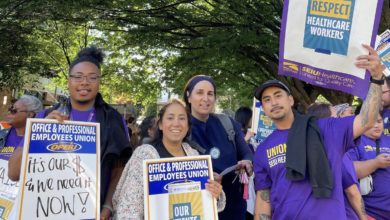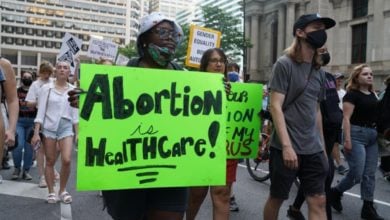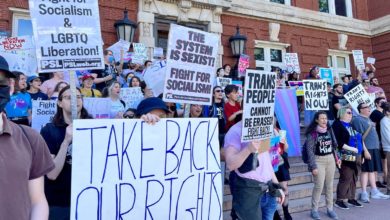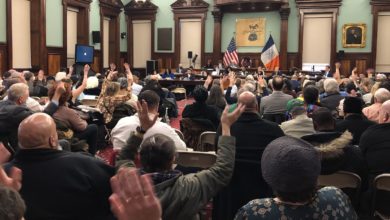This article is adapted from a talk given at the April 1 Socialism Conference hosted by the Party for Socialism and Liberation in Washington, D.C.

The District of Columbia is the capital of the richest country in the world. In an area smaller than Rhode Island, Washington, D.C. houses all three branches of the most powerful and influential government in the world—the president of the United States and his cabinet, the United States Supreme Court and the Congress. Just a few miles away sits the headquarters of the greatest war machine in the world, the Pentagon.
But Washington is not just the seat of the most powerful government in the world. It is also home to some of the most powerful financial institutions in the world. For example, the headquarters of the World Bank and the International Monetary Fund are within walking distance of the White House.
From this tiny amount of land, decisions that affect millions—if not billions—of people are made on daily basis. One would imagine that being situated in such close proximity to the most powerful and far-reaching political, economical and military entities in the world, the five million people who live in the Washington metropolitan area would be well cared for.
Unfortunately, this could not be farther from the truth.
Revolutionary thinker Karl Marx described capitalism as being contingent upon very specific historical and social conditions. In capitalist society, a very small group of wealthy and powerful people coexists with the millions of property-less working-class people whose freedom consists mainly in the freedom to either work for the benefit of a small ruling class or to starve.
The District of Columbia is the epitome of capitalism under these circumstances. As such, the District of Columbia is really two cities. On the one hand, Washington, D.C. refers to the place where the richest and most powerful people in the world come together to dictate this country’s and the world’s future. On the other hand, D.C. refers to a geographical space where millions of working class people have to fight to survive and to make a living.
Just how powerful is the U.S. government? What does it have the power to do?
Earlier this year, George Bush proposed increasing the military budget in 2008 to more than $500 billion. According to Harvard economist Linda Bilmes and former Clinton adviser Joseph Stiglitz, the Iraq war is estimated to cost more than $2 trillion.
That is more than 2 million dollars. That is more than the annual gross domestic product of France. The defense budget of the United States is greater than the defense budgets of all the other countries in the world combined.
These sorts of monumental decisions are made right here in D.C., the home of the U.S. government.
Healthcare crisis
While a handful of powerful people make decisions regarding the handling of trillions of dollars in D.C., earlier this year in Prince George’s County—the Maryland county adjacent to D.C.—a 12-year-old African American boy by the name of Deamonte Driver died of a toothache. A bacterial infection spread from his tooth to his brain, killing him.

All he needed was an $80 tooth extraction, but Deamonte’s mother could not afford it because her Medicaid coverage lapsed. In fact, even if it had not lapsed, less than one in five dentists are willing to treat Medicaid patients.
The case of Deamonte Driver is not unique. The United States, alongside Britain, ranked last in a February 2007 United Nations report regarding the well-being of children in industrialized countries. The United States ranked last in health and safety of children, which is measured by rates of infant mortality, birth weight, immunization and deaths from accidents and injuries. This is in the richest country in the world.
There is a mathematical explanation for this incredible inconsistency where lawmakers in D.C. can budget trillions of dollars for imperialist wars but, a few miles away, a child dies of a toothache. For example, in the case of the defense budget, the increased amount of money has to be taken from somewhere.
While President Bush wants to spend trillions of dollars for the death and destruction of human beings around the world, he wants to cut $66 billion of funding from Medicare and $26 billion from Medicaid. In total, Bush wants to cut more than $100 billion of funding for health care in a country where nearly 47 million lack health care.
How many congressmen or senators do you think lack health care? How many financial analysts at the IMF do you think cannot afford to pay for their children’s dental care? While they sit around pushing paper and playing with numbers for the good of no one but the ruling class, large sectors of the D.C. working class are living in crisis.
According to the Whitman-Walker Clinic, the percentage of adults living with HIV in Washington, D.C. is higher than 27 of the 44 sub-Saharan nations in Africa, including Nigeria, Angola and Ethiopia. One in 20 adults in D.C.—five percent of the population—are living with HIV.
The rate of new AIDS cases in D.C. is 12 times the national average. There are about 3,000 people between 13 and 24 years of age who are HIV positive in the D.C. metro area. Most of these young people come from the poorest third of all households in the city. According to the executive director of Metro TeenAIDS, “Young people who are sexually active are less likely to visit a doctor because they fear having to pay for something.”
How can U.S. lawmakers even think about cuts in health care in order to fund an illegal war when the health care crisis in the city where they sit resembles that of sub-Saharan Africa? How can the World Bank claim that the HIV and AIDS crisis in Africa is an issue of economic development, when here in D.C., the capital of the wealthiest county in the world, the rate of HIV is higher than 22 sub-Saharan African countries?
It is not just health care that is in crisis in our capitalist society. Bush has proposed cutting 141 social programs, including education programs, in order to fund the increased defense budget in 2008. Meanwhile, according to the U.S. Department of Education, one in five adults in the United States is functionally illiterate. Functionally illiterate means having trouble doing things like comprehending bus schedules, reading maps, and filling out job applications.
The ratio of functionally illiterate people in D.C. is nearly twice the national average. A third of adults in D.C. fall into this category.
Not a mistake
These sorts of contradictions are not mistakes. These are not unfortunate, random occurrences. They are an inherent and essential element of the capitalist society we live in, in which the ruling class serves only its own interests by oppressing and exploiting the working-class people who have nothing to sell to the ruling class except their capacity to work.
Class oppression and racism are built directly into our government. Of the 100 senators who assemble right here in D.C., nearly half are officially millionaires. Ninety-seven of them are white. On the other hand, nearly 60 percent of D.C. residents are African American. D.C. residents are not even represented in Congress.
Knowing this, are you surprised that the interests of the working class are not represented? Is that democracy? Bush spent much of his childhood at the “Bush compound” in southern Maine. It has nine bedrooms, four sitting rooms, a four-car garage, a pool, tennis court, dock, boathouse and guesthouse. Do you think someone who has grown up in this environment has any clue as to the plight of the working-class individual?
But it is not just ignorance on the part of the ruling class that is to blame. The ruling class simply has different, opposing interests from the working class. Under capitalism, we as working people are not humans but simply either a source of profits or just another expense.
What could be done?
The more than $2 trillion spent on the Iraq war could provide full tuition through four years of college for 18 million students. It could provide over 216 million children with health care.
There are 73 million people under the age of 18 in the United States. With the money that will be spent on the war on Iraq, we could provide health care for every child in the country—and every child in Mexico and then some.
The budget for the war on Iraq could build over 3 million additional public housing units. We could house each and every one of the 744,000 homeless individuals and still have housing units left over.
With the amount of money being spent in waging war against the Iraqi people, New Orleans could be completely restored.
Why isn’t the government doing these sensible and necessary things with money that the U.S. government apparently has? Why do its priorities seem so upside-down, against the best interests of the vast majority?
Because in this capitalist society, the needs of the working class are irrelevant. Under capitalism, the priority is not the millions of working people but the interests of a few wealthy individuals.
This is the essence of capitalism. The United States is a society where the 400 richest people own more than 50 million families combined. It is a society where trillions of dollars are spent to wage war on innocent Iraqis, but the victims of Hurricane Katrina are told to get lost. It is a society where the government not only allows such monstrous disparities to coexist, but uses its authority to maintain, promote and facilitate these monstrosities.
The politicians claim to represent us. But, after all, so many of our politicians, like Bush and Cheney, are members of the ruling class themselves.
The U.S. government is indeed a government of the ruling class, by the ruling class, for the ruling class. A glance at the city of Washington, D.C. demonstrates this.
But the silver lining is that the workers are the vast majority of this country. This diseased capitalist society is bound for destruction.
The power to change this rotting society lies in the hands of the masses. It is time to exercise this power.
Crystal Kim
Photo: Natasha Persaud
One in 20 Washington, D.C. residents is living with AIDS.
Photo: Tim Sloan/AFP





